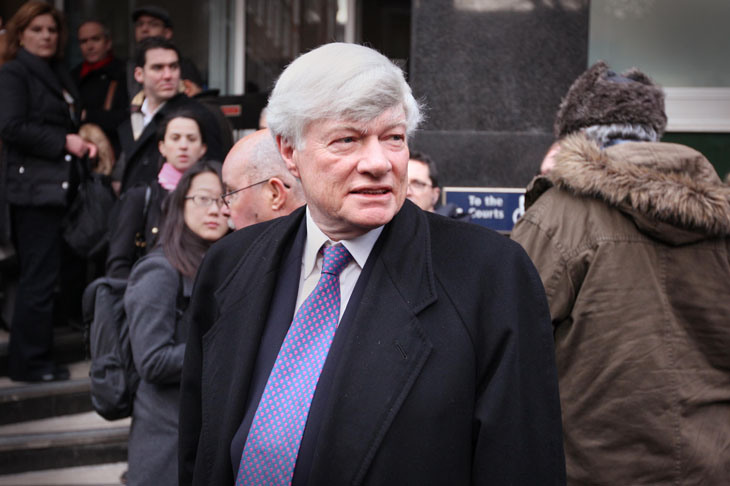What makes a barrister famous? At one time, many of the best advocates were also prominent politicians, whose day job was in court and who moonlighted in the Commons — think F.E. Smith. But it is impossible today to double up with any distinction. As long as capital punishment survived, public attention also attached to those great defenders who rescued their clients from the noose — think Edward Marshall Hall. But English judges no longer don the black cap to pronounce the sentence of death.
Geoffrey Robertson, the author of this riveting memoir, ticks the boxes which guarantee the reputation of the modern celebrity silk: chiefly, a concentration on the fashion-able area of human rights, with a special interest in press freedom, making him a hero of the left-wing media. A prominent member of the Australian diaspora — along with Clive James, Barry Humphries, Germaine Greer and his wife Kathy Lette (they’ve now separated), the paronomasiac comic author — he has pursued a career unusual in its peripatetic nature and the variety (and notoriety) of his clients.
After cutting his teeth as a student activist in Sydney, he joined the defence team in London of the magazine Oz — which had been charged with conspiracy to corrupt public morals — and graduated through a series of obscenity trials to represent Julian Assange, Salman Rushdie, the directors of Matrix Churchill, ethnic minority Indians, victims of a Fijian constitutional coup, and, in Hong Kong, refugees in flight from Vietnamese persecution. As well as taking on demanding death-row cases in the Caribbean, he can claim credit for such developments in the law as the protection of journalists’ sources; the defence of provocation for battered wives; the identification of the limits of the law of treason and of claims to diplomatic immunity. A believer that human rights are global, Robertson served as president of the UN war crimes court in Sierre Leone, which ruled for the first time that recruitment of child soldiers was an internation-al crime.
Aa an advocate who has fought causes through cases, his submissions have resonated as much with the press bench as with the bench of judges. On one occasion, he earned the senior law lord’s reproach that ‘you keep giving us this airy-fairy theory about free speech’ (but he won the case in Strasbourg); on another, the despairing praise of Mary Whitehouse, who had brought a private prosecution for blasphemy, for his ‘truly remarkable performance’. Robertson is a natural raconteur, telling many a good tale well, with a talent for tweaking cliché into epigram.
Generous about his friends, he is somewhat careless in his references to those beyond his liberal orbit. Norman Lamont was John Major’s chancellor of the exchequer, not Thatcher’s. And it was Michael Gove, not Andrea Leadsom, who pronounced at the start of the Brexit controversy that we have had enough of experts. If we have, it would spell trouble for Robertson, who describes himself as a lawyer who ‘happened to be an expert’ on forum non conveniens (used to determine whether a case should proceed here or abroad), as well as ‘something of an expert on conspiracy law’, and even ‘a world expert on censorship’. But at another point he suggests that he has been ‘nothing more or less than a jobbing barrister’. I wouldn’t agree — and I doubt whether he would really either.
Robertson has been an innovator outside as well as inside court. In 1990, he founded Doughty Street Chambers, beyond the confines of the Temple, appointing a female senior clerk in that last redoubt of the patriarchy. The firm, starring such as Helena Kennedy, Edward Fitzgerald and Amal Clooney, is committed to a campaigning ethos which, in Robertson’s words, ‘has already spawned rivals and imitators’, not least the uber-modern Matrix.
But he has also led a vivid life beyond the law, as a journalist, television-presenter and opera aficionado, with a taste, when single, for alpha-female lovers (whose photographs intersperse the text), and — though he’s republican — a fine line in royal anecdotes. Ever alert to the latest trends, he has even resurrected a mini #MeToo episode, of possible sexual abuse by a doctor when he was four years old.
In his epilogue to this second volume of autobiography, Robertson, now 71, muses on the possibility of retirement, but rejects it with mention of ‘the prospect of a gas and oil arbitration in Paris in the spring’ — a subject even he would be hard put to make into a page-turner.
His contemporaries at the bar will read these memoirs with envy; others with almost as much enjoyment as his eminent entourage attests to on the dustjacket.






Comments